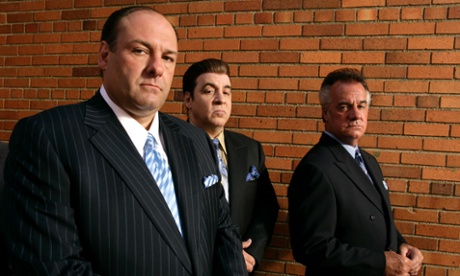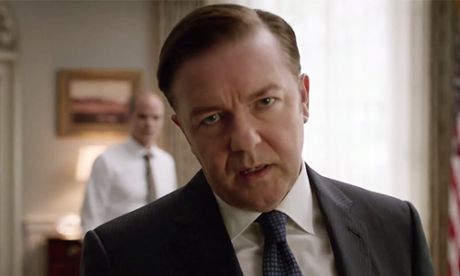Ryan Murphy, the prodigious television workhorse, is now Netflix’s $300m man. The news on Tuesday that the streaming giant had acquired Murphy’s services with a hefty five-year deal shook up the television industry, with one of its foremost auteurs announcing his plan to flee the coop of 20th Century Fox TV for Netflix come summertime.
The pact includes plans for television series, feature films and documentaries, and marks what’s believed to be the most lucrative contract in television history. And that’s after the streaming service lured Shonda Rhimes away from ABC with a four-year deal worth an estimated $100m last August.
So how, exactly, did a self-professed “gay kid from Indiana who moved to Hollywood in 1989 with $55 in savings in my pocket” land at the center of a fierce bidding war between Disney-Fox, Netflix and Amazon?
The answer, evidently, is by creating a vast and dynamic consortium of television shows, the sheer range of which shows that the 52-year-old Murphy can bring to Netflix the combination of awards prestige and bingeability it has spent years cultivating. Murphy’s shows have run the gamut of form and content – a kitschy, high school drama-musical; a craven horror anthology; a half-hour broadcast comedy; a law enforcement procedural; a true-crime anthology – but in each, one can glean his distinct stamp and sensibility. That’s all the more impressive given that Murphy, like Ryan Seacrest and Oprah Winfrey in reality TV and talk shows, operates as a kind of impresario, writing and directing most of his pilots before delegating duties to his trusted collaborators.
But the Murphy empire has been steadily building for two decades: he began his career as a journalist, writing for the Miami Herald, the LA Times, and Entertainment Weekly, before trying his hand at scripts in the late 1990s. One of his screenplays, a project called Why Can’t I Be Audrey Hepburn?, featuring a Holly Golightly enthusiast who’s left at the altar, was bought by Steven Spielberg but idled in pre-production for years. Soon, Murphy moved to television, where he and Gina Matthews co-created Popular, a catty, teenage dramedy that fizzled out after two seasons but laid the groundwork for the kind of campy bravura that would come to define the Murphy mien.
His big break arrived in 2003 with Nip/Tuck, the soapy and provocative drama about two Miami cosmetic surgeons, for which Murphy won his first Golden Globe. And then, propitiously, came Glee, which premiered its pilot the May before that year’s fall TV season and seemed to swallow the culture whole through the summer, when kids suddenly became acquainted with Journey and rightwing evangelists chafed at the show’s frank depictions of teenage pregnancy and gay romance. Though Glee grew disjointed and gauche as the seasons went on, it was mostly big-hearted and great fun, the first, unassailable evidence that a Murphy production had not only panache but real commercial heft.
At NBC, Murphy went on to create The New Normal, a loosely autobiographical half-hour comedy about two gay men and their surrogate. But it was at FX, the subsidiary of 21st Century Fox, where Murphy acquired critical cachet, first with the anthological series American Horror Story, where he began working consistently with muses like Jessica Lange and Sarah Paulson, and then with American Crime Story: The People v OJ Simpson, which took home a truckload of awards at the Emmys and Globes.
The marriage of Murphy and Netflix has big implications: for one, it shows that Netflix is deploying its cash pile with zeal, poaching arguably the two biggest producers in television from the networks they’ve called home for over a decade. It’s also not merely incidental that the streaming service has been jostling, with limited success, for awards show recognition, which Murphy’s programs generally reap. “Ryan Murphy’s series have influenced the global cultural zeitgeist, reinvented genres, and changed the course of television history,” said Netflix chief content officer Ted Sarandos of the deal.
The move also spells trouble for 21st Century Fox, which is in the process of being acquired by Disney. “Am I going to have to put Mickey Mouse in American Horror Story?” Murphy supposedly asked Disney chief Bob Iger during the bidding wars.
It’s also a blow to FX – home to Horror Story, Crime Story, and Murphy’s fantastic period drama Feud – which had positioned itself as a force to be reckoned with opposite HBO, Netflix, and Amazon. Now, with Murphy’s exit, and that of Louis C K (dropped after numerous credible accusations of sexual misconduct), the network will rely mostly on Donald Glover (of Atlanta) and Noah Hawley (of Legion and Fargo) to avoid losing ground in the TV horse race.
But lost on no one, and certainly not Murphy himself, is the monumentality of both the price Netflix spent and the man they spent it on. Murphy’s shows are big and brash, but they’re not run-of-the-mill television: they centralize women, queer people, and misfits, those who live on society’s fringes.
With Feud, a deliciously entertaining dramatization of Bette Davis and Joan Crawford’s career-long squabbles, Murphy deigned to cast two actors over 65 as the leads; Pose, his upcoming 80s-set musical series, features a cast of several trans people of color; his award-winning HBO film The Normal Heart, about the early years of the Aids crisis in New York City, was a deft, moving adaptation of Larry Kramer’s original play; and the latest season of American Crime Story, documenting the murder of Gianni Versace, paints a devastating portrait of the virulently homophobic 1990s. That Netflix is shelling out this kind of money for both Murphy and Rhimes suggests not just a rising tide, but a sea change, and a long-overdue acknowledgment of the vitality of diverse storytelling and storytellers.
Before the deal was announced, Murphy already had plans to produce two shows with Netflix. Ratched, an origins tale of the tyrannical nurse from Ken Kesey’s novel One Flew Over the Cuckoo’s Nest, will star Sarah Paulson in the title role and premiere sometime in 2018. And The Politician, a political drama-musical hybrid that’s reported to involve both Gwyneth Paltrow and Barbra Streisand, is in the early stages of development.
In the ongoing streaming wars, the acquisition of Murphy shows that Netflix, which has blown past 100 million subscribers, is flexing its muscles as competing studios and streaming services creep closely behind. Murphy’s price was reportedly driven up by competition from Amazon Studios, and Apple has pledged $4.2bn towards original content through 2022, including $240m for a series starring Reese Witherspoon and Jennifer Aniston. Although the Murphy deal looks like cash-burning to some, Netflix seems to think it a worthy investment. And in what are turbulent, economically disruptive times for television, few producers are as reliably prolific and paradigm-shifting as Murphy.











